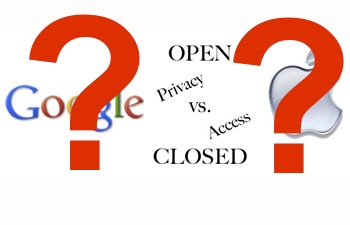It’s not too hard to make predictions. What’s harder is to honestly evaluate how you did. In that spirit, I’d like to ask your help.
Early this year, I predicted how 2011 would go in digital media. I’d love it if you gave me a letter grade with a Tweet to @dbenk (#gradeDBenk), message to Dorian Benkoil on Google+, or a comment below.

Meanwhile, I’m assigning myself as judge, jury, executioner and palanquin bearer. I’ll try to be as tough as I am for the business school graduate students I teach in media and entertainment technology management.
The Battle of Open Vs. Closed: B+
For 2011, I foresaw a battle of “Open vs. Closed” orientations from media companies in the digital sphere, positing that all the year’s trends could be squeezed into this one.
I think I got the basic issue right. Yet, rather than a “battle,” it looked more like a scramble. Media production and distribution companies tried to both charge for content and give it away.
The New York Times, Hulu and others tried to finesse both open and closed models, sometimes adjusting as they went.
The New York Times instituted a pay fence and kept trying to thread the needle between keeping traffic up by giving its work away, while making its most avid fans pay.
The Financial Times eschewed Apple’s restrictive iPad policies and put its efforts instead into an HTML5 app that lives on the web but lets only subscribers get the full content offering. Walmart launched a web-based video service, Vudu.
Amazon, too, went the web app route with its Cloud Reader that, unlike its iPad app, lets consumers order directly from Amazon, something Apple doesn’t allow through apps it approves for the App Store.
Hulu solidified premium offerings, saying you could get its content on the iPad or iPhone only if you paid for the app, and integrated its paid service into other devices such as the Roku box. Fox delayed its offerings on the free Hulu service by eight days. Hulu claims to be closing in on 1 million paid subscribers for the year.

Amazon’s new Kindle Fire tablet is on the open-source Android platform but has “branched” the operating system to make it friendly with the device and the Amazon store and app market. That’s both open and closed.
I had also predicted continued “open” vs. “closed” battles in Washington. Sure enough, prosecutors are finally making their case against the soldier who allegedly sent protected information to WikiLeaks.
On the policy front, the Federal Communications Commission instituted rules that protect the concept of Net neutrality, saying Internet service providers can’t block or slow traffic. The FCC is now facing lawsuits from Verizon and others, as well as attempts in the Senate to block the regulations.
I didn’t predict legal wrangling over copyright. To combat those who are illicitly providing content for which its producers want to charge, law makers (and nearly all media companies) are pushing SOPA, the Stop Online Piracy Act.*
Opponents said SOPA would choke much of the creativity and sharing that has made the Internet so rich, and industry lobbyists fanned the flames on both sides.
Boycotts were called for SOPA supporters like GoDaddy and 3M, and opponents are discussing a counter bill, which The Atlantic has nicknamed OPEN. We’ll see more of these battles next year.
The Battle Over Privacy: A-
There were, as predicted, intense discussions in Congress and federal agencies over whether to tamp down on the current open Internet practices in the name of protecting people’s private information.
Industry groups, the Interactive Advertising Bureau a leader among them, fought a rear-guard action that appears to have held up the most draconian measures, such as ones that would have required advertising on the web to always ask a user’s permission to institute even basic measurement. (Disclosure: My company has done work for the IAB.)
IAB CEO Randall Rothenberg said industry efforts at self-regulation, under which publishers and advertisers agree to uphold best practices and disclose what information they are collecting and sharing, means the effort at strict regulation ““seems to be on the wane”:http://www.digiday.com/stories/privacy-battle-cooling-ad-tech-too-confusing/.”
Still, if Congress ever gets over its gridlock on bigger matters, it may come back to the privacy issue especially after the November elections.
Google vs. Apple: A

Anyone who’s paid attention can probably agree that these two Goliaths are fighting tooth, nail, finger, leg, foot and gun.
Google’s Android operating system has overtaken Apple’s iOS in phones, and is making inroads in tablets, with a big leg up from Amazon’s Fire.
But Apple says core features of Android, such as certain finger gestures and internal coding, were stolen by its rival up the road in Silicon Valley.
Steve Jobs told biographer Walter Isaacson he’d “spend my last dying breath if I need to” and all of Apple’s $40 billion in cash “to destroy Android,” which Jobs said was “stolen” from the company he founded. “I’m willing to go to thermonuclear war on this,” he said.
Apple won parts of a lawsuit against HTC this month over infringement of iPhone-related patents, though not at the deep coding level, and suits are continuing against other makers of Android phones such as Samsung. (Apple can’t easily go after Google because it doesn’t actually make the devices and it provides Android openly, for free.)
Google’s Chrome browser installs have overtaken both Apple’s Safari and the open-source Firefox, according to StatCounter. That gives Google a leg up in desktop browsing, and offerings such as its web apps, which compete with iOS apps.
Google’s Chromebook computer, meanwhile, failed to make a dent even as Apple reached a 15-year high, with 5.2 percent of the world PC market.
Social Media Will Not See a Dip: A
It’s hard now to believe that some were predicting a slowdown in social media this year.
Comscore found that social networking by this fall took up one of every five minutes spent online globally and reached 82 percent of Internet users over age 15 at home and work, according to eWeek.
Facebook reaches more than 55 percent of the world’s user base, Comscore said. Founder Mark Zuckerberg told public TV interviewer Charlie Rose a few weeks ago that the company could reach 1 billion users in the near future.
Twitter, running second, well behind Facebook, also continues to grow, and LinkedIn has seen an increased presence as a professional network and a traffic referrer to media websites.
While some greeted the advent of Google+ with a beleaguered sigh, the site is said to be gaining on LinkedIn’s 94 million visits with 66 million last month, according to Comscore.
Meanwhile, platforms and applications with heavy social elements, such as Tumblr, Foursquare, Instagram, News.me and Flipboard, picked up users and interest; Facebook acquired Gowalla; and it’s rare to see a consumer-facing web product without a strong social element.
Social is still the rage, and a big buzz machine. Columbia University Journalism School’s Social Media Weekend, in which I’m participating, has dozens of signups days after opening up seats at $200 each.
Social media are still being integrated into ads, measurement platforms, apps and more.
= = = = =
So, I think I did well enough to pass. If I weight my average so the top is worth more, and you believe my ratings, I’m somewhere around an A-.
I’d love to know your thoughts, and it helps if you #gradeDBenk. I’ll give more of my thoughts, looking ahead to 2012, in my next column.
- CORRECTION (1/2/12): A previous version of this story incorrectly spelled out SOPA as the Stop Online Privacy Act when in fact it is the Stop Online Piracy Act. Thanks to commenter Shatcher33 for pointing out this error.
An award-winning former managing editor at ABCNews.com and an MBA (with honors), Dorian Benkoil handles marketing and sales strategies for MediaShift, and is the business columnist for the site. He is SVP at Teeming Media, a strategic media consultancy focused on attracting, engaging, and activating communities through digital media. He tweets at @dbenk and you can Circle him on Google+.

